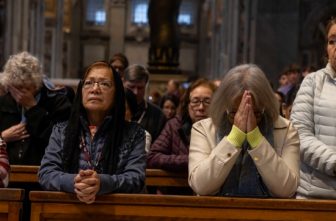We, like the apostles, are asked to be evangelizers, as unworthy as we may be

The Twelve Apostles were the first main group of evangelizers. It was their privilege and mission to tell the story of Jesus; to proclaim, share and spread the Gospel; and to bring others to belief and help them deepen their faith.
Their initial training as evangelizers came at the feet of the Master, Jesus himself. After he called the apostles by name, they were his constant companions and watched him in action as a preacher, teacher, healer, miracle worker, Scripture interpreter, recruiter, group leader, traveler and man of prayer.
After an initial period of observation, Jesus provided an opportunity for on-the-job training. He sent them out two-by-two (Mark 6:7), and they preached repentance, drove out demons and anointed with oil many who were sick and cured them (see Mark 6:12,13). Their first attempts as evangelizers proved quite successful.
Calling the unworthy
Despite their strong start, however, the apostles were ill-prepared to venture off on their own. They were unable to heal a boy with a demon, presumably because their prayer was weak (Mark 9:28-29). The apostles displayed lack of comprehension (Mark 4:13), little faith (4:40), hard hearts (6:52), competitiveness (9:34), possessiveness (9:38), selfish ambition (10:37) and jealousy (10:41).
Worst of all, when Jesus was arrested, they all left him and fled (Mark 14:50). And, disappointingly, they were nowhere to be found during his trial, torture, crucifixion and burial. The apostles were in no way ready or worthy to be evangelizers.
Amazingly Jesus asks sinners to serve him. After the resurrection, Jesus appeared to the 11 and commissioned them to be his evangelizers: “Go into the whole world and proclaim the gospel to every living creature” (Mark 16:15). Jesus calls the unworthy and makes them worthy, he sends forth the weak and makes them strong. And the apostles obeyed: “They went forth and preached everywhere” (16:20).
Pentecost was decisive. The descent of the Holy Spirit and the infusion of divine grace transformed the apostles from fearful to courageous, timid to assertive, hesitant to confident and reserved to bold. After Peter was filled with the Holy Spirit, the one who had cowered behind locked doors stood before the crowds bravely and loudly proclaimed Jesus (Acts 2:14-40).
The apostles underwent intensive preparation before they went their separate ways. Personal readiness is indispensable because “you cannot give to others what you do not have yourself.”
The apostles built strong bonds of friendship with each other, prayed together both in the Temple and in their homes, broke open the word and broke bread (see Acts 2:42,46). Solid personal faith is the foundation of every evangelizer.
The apostles were commissioned by Jesus, empowered by the Holy Spirit and strengthened by word and sacrament, which led them to another degree of transformation. Those who relished common time were willing to disperse for the sake of the Gospel, those who stayed close to home were ready to travel great distances, and those who dreaded the thought of torture and execution were prepared to suffer and die.
The 11 traveled far and wide to spread the Gospel:
- Peter throughout Israel and to Antioch, Corinth, and Rome;
- Andrew to Asia Minor and Greece;
- James the Greater to Spain and back to Jerusalem;
- John to Ephesus, Patmos and possibly Rome;
- Philip to Phrygia and Hierapolis in Asia Minor;
- Thomas to Syria, Persia, and India;
- Bartholomew or Nathanael to India, Lycaonia, Mesopotamia, Persia and Armenia;
- Matthew or Levi to Judea, Ethiopia and possibly Persia, Syria and Macedonia;
- James the Lesser or James the son of Alphaeus in and around Jerusalem;
- Simon the Zealot, Cananaean or the Less to Egypt and Persia; and
- Jude or Thaddeus to Mesopotamia and Persia.
All except John suffered a martyr’s death.
Staying close to Christ
We, like the apostles, are called to be evangelizers, unworthy that we may be. Jesus asks mere sinners to do great things in his name.
We cannot give to others what we do not have ourselves. Therefore, it is imperative that we stay close to Jesus in word and sacrament because the more we know his word, the better we can share it; and the more that Jesus takes over our being (see Galatians 2:20), the more we will be able to radiate his presence.
Father Van Sloun is pastor of St. Stephen in Anoka.




